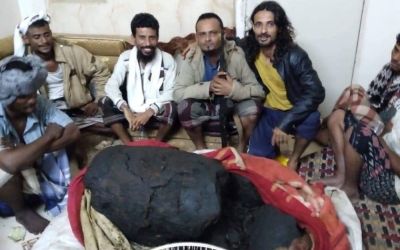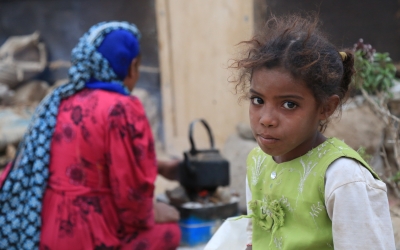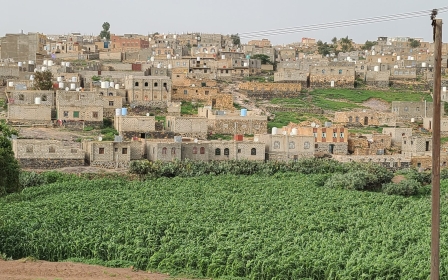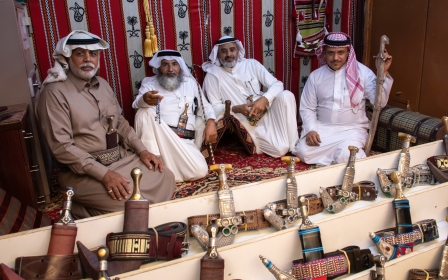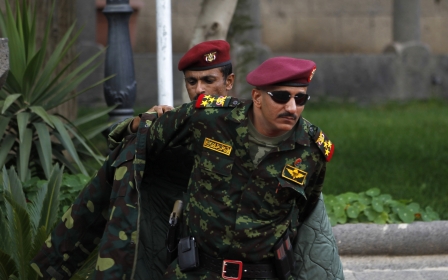‘Our children are fuel for war’: Village sons leave Yemen countryside for the battlefield
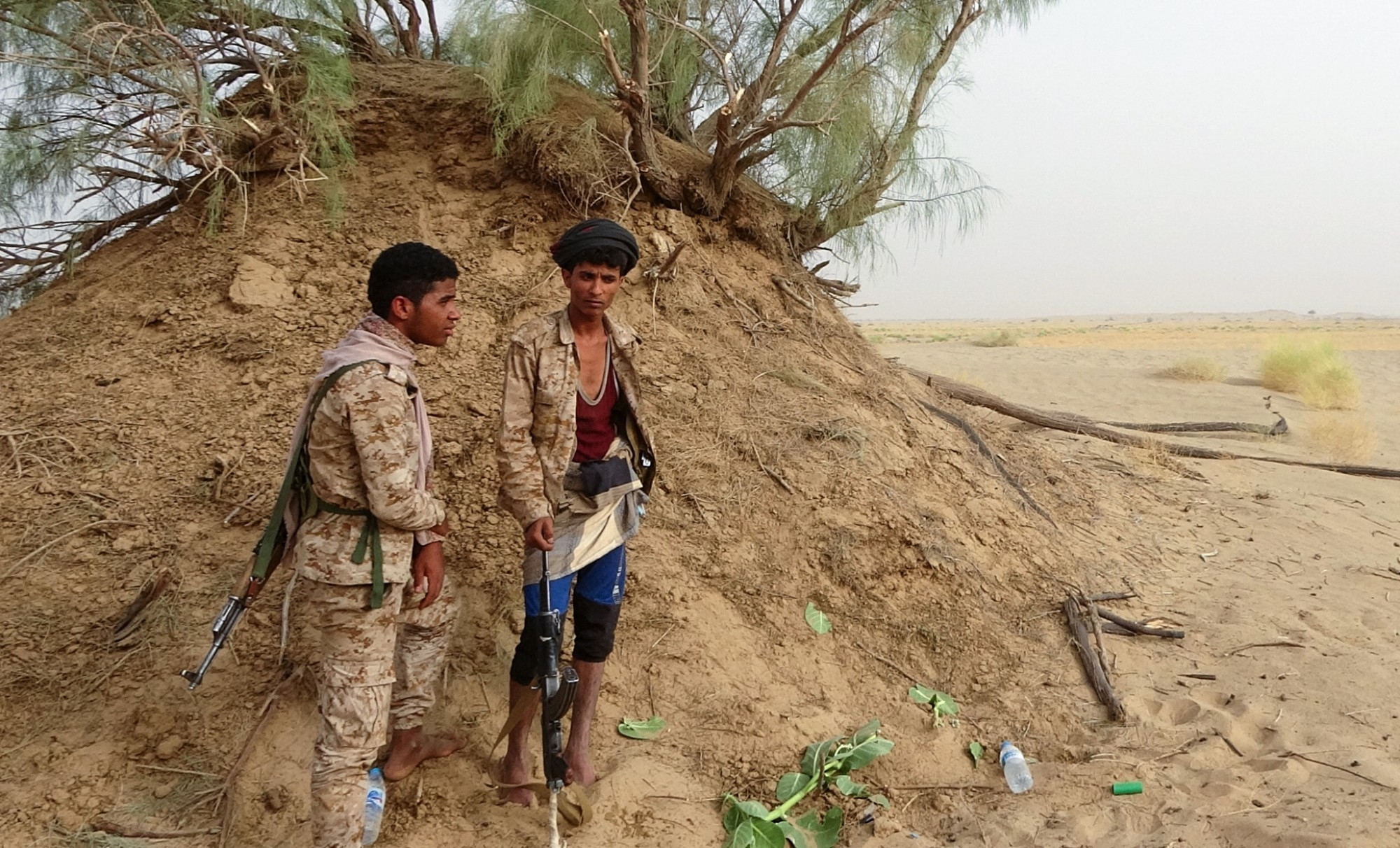
Like many young men around the world, 18-year-old Tamer* faced a choice when he graduated from secondary school: go to university, or look for work.
Most sons from the villages of the al-Shimayateen district, in Yemen’s southwestern Taiz governorate, pick between these two same options. But Tamer was attracted to yet another prospect, one which he saw promising wealth and a good life, despite the risks: joining the conflict raging in the country for over six years.
New MEE newsletter: Jerusalem Dispatch
Sign up to get the latest insights and analysis on Israel-Palestine, alongside Turkey Unpacked and other MEE newsletters
Thousands of Yemenis from far-flung provinces fighting under the leadership of Tareq Saleh, the nephew of late Yemeni President Ali Abdullah Saleh, have joined battles against Houthi rebels on the country’s western coast. These fighters and their families have rented homes in the Taiz countryside, providing an unexpected source of income for cash-strapped villagers.
But while villagers have opened up their homes to pro-Saleh fighters paying high rents in coveted Saudi currency, their presence has inspired a number of young men in the mountainous communities to follow their example and take up weapons.
“We rented our father’s house to a fighter supporting Tareq Saleh, and Tamer noticed how rich he is, and how good his children’s lives are, so that has influenced him,” Tamer’s father, Khalid, told Middle East Eye.
“Tamer sat with the fighter a lot and heard a lot of details about fighting and the income they received, so he came to me asking to join the battles,” Khalid, who requested to use a pseudonym out of fear of reprisals, added. “At first, I didn’t accept this, as I was hoping to see him at university and not on a battlefield. But then he convinced me when he said that he didn’t want to be a poor man suffering to provide for his family.”
As countless Yemenis suffer from the humanitarian consequences of the war, many families have had to grapple with the difficult decision of whether to allow their sons to take up weapons, less out of political conviction than economic necessity.
Battlefield breadwinner
Khalid used to own a cafeteria in the city of Taiz, but it closed in 2015 as a Saudi-led coalition began fighting against Houthi rebels in Yemen. The father of six then emigrated to Saudi Arabia undocumented, only to be expelled from the country. Since then, he has returned to his village, but remains unemployed.
“It is difficult for me to pay for Tamer and his five siblings' studies, and [Tamer] himself saw that the majority of university graduates are jobless, so we agreed for him to fight, only for a few years,” Khalid said.
Even though Tamer’s mother opposed the decision, the young man was taken to the battlefield in Mocha on the western coast six months ago, by an old pro-Saleh fighter who had moved to the family’s village from Dhamar governorate.
Tamer had no prior experience on the battlefield - but like many young men from the Yemeni countryside, he knew how to handle a Kalashnikov, making the transition relatively easier for him.
Nowadays, Tamer is the breadwinner of his family, with his salary going towards paying for his siblings’ studies.
“Tamer receives 1,000 Saudi riyals [$266] per month, which is a lot,” Khalid said. “He is sending us his whole salary every month, and we spend some of it and save the rest for him to start a project when he returns.”
But the financial relief provided by Tamer’s new occupation does not erase his parents’ concerns about his safety.
“This isn’t the perfect life I had hoped for,” the young man’s father said. “It’s true that we have money like fighters from Dhamar, Ibb and Hodeidah [provinces], but I’m worried to see my son has become a fighter.”
‘Killing our sons’ futures’
Not all young men consulted their parents before making such a difficult decision.
Abdulghani*, 52, a teacher in al-Shimayateen, had been helping his son look for work in Taiz city and elsewhere, after he saw that the teenager was lacking motivation to finish secondary school.
“Work is difficult to find nowadays, but I had been doing my best to look for work for my 16-year-old son before he fled the house for the western coast,” Abdulghani told MEE.
Abdulghani hadn’t been aware that his underage son had been planning to join pro-Saleh forces when he left the family home four months ago.
“Villagers are happy to see fighters in their villages because of the money, but who is responsible for losing my son and many others?” he asked. “I’m a teacher and we live in a peaceful village, but those pro-Saleh fighters are brainwashing our sons and encouraging them to join them on the battlefield.
'If my son meets his fate on the western coast, who is responsible for that? Is it pro-Saleh fighters, the villagers who accepted them, or the leaders who encouraged the war?'
- Abdulghani, father of a teenage fighter
“They are using our children as fuel for the war.”
Abdulghani tried several times to convince his son to come back home - to no avail.
“I asked some pro-Saleh fighters to help me get him back, but no one helped,” he recounted. “They can help to send our sons to battle, but not the opposite. I pray to God to help me get my son back and take those fighters out of our village.”
The teacher said he was shocked to see many residents of Taiz react nonchalantly to the increased presence of fighters from all over the country, now settling across the province.
“I’m willing to only subsist on bread and water, but not to accept those fighters who damage the future generation of my village,” he said. “This isn’t prejudice on my behalf - I can accept civilians in my village from anywhere around the world; this is anger against the fighters who kill our sons’ futures.
“If my son meets his fate on the western coast, who is responsible for that? Is it pro-Saleh fighters, the villagers who accepted them, or the leaders who encouraged the war? All share the responsibility.”
‘Death in front of my eyes’
Dhaif Allah, a pro-Saleh fighter from the Ibb province who lives in al-Shimayateen, denied accusations by parents like Abdulghani that they were actively recruiting young men and teenagers from the villages.
“We live here as individuals, not as fighters, and we avoid talking with villagers about fighting, but some go themselves to Mocha and sign up as fighters,” he claimed.
“It isn’t right that people accuse us of standing behind the recruitment of their sons, and it isn’t our fault if they don’t want to study,” the fighter told MEE.
Tamim Mohammed, 19, left home four months ago to fight alongside pro-Saleh forces. The young man said that while fighters renting in his village didn’t actively encourage him to join the war, he saw how well they were earning a living and wanted to be like them.
“To see the life of the fighters is enough to be convinced to join battles - but it isn’t easy even if there is a good salary,” he told MEE.
“When I first arrived on the battlefield, I saw death in front of my eyes. I saw people injured and heard shelling around us,” Tamim added. “Money is nothing in comparison to the danger of the battlefield. Money may cost life there.”
Tamim only stayed three weeks on the western coast before he fled back home. He has since resumed his studies at secondary school, and hopes to go to university.
'Money is nothing in comparison to the danger of the battlefield'
- Tamim Mohammed, 19-year-old former fighter
“One day, the war will end and fighters will find themselves lost. Education is more important than money,” he said.
Even Khalid, who agreed for his son Tamer to join the fighting, believes education remains the priority.
“I hope to see my son return and complete his studies, and I don’t want to see pro-Saleh fighters in my village, as they have encouraged dozens of our sons to join battles.”
*Interviewees requested only first names be used
Middle East Eye delivers independent and unrivalled coverage and analysis of the Middle East, North Africa and beyond. To learn more about republishing this content and the associated fees, please fill out this form. More about MEE can be found here.



